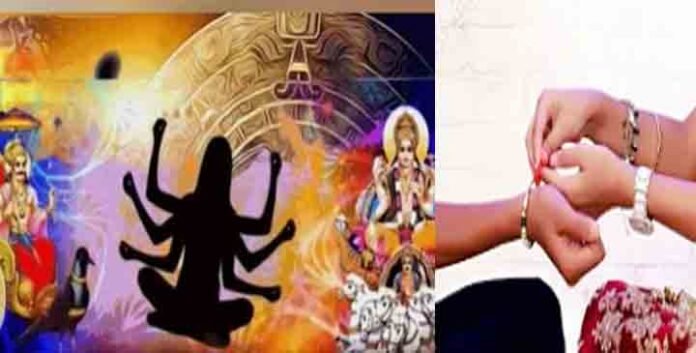Discover the mythological significance of Bhadra Kaal and why tying rakhi during this period is forbidden. Understand the relationship between Bhadra Kaal and the ‘God of Sin’ and ensure your Raksha Bandhan celebrations are auspicious and blessed.
Rakshabandhan, a revered festival in Hinduism, is a celebration of the unbreakable bond between brothers and sisters. On this day, sisters tie rakhi on their brothers’ wrists, symbolizing love, protection, and a promise of mutual care. However, this year, Rakshabandhan falls on 19th August, coinciding with Bhadra Kaal—a period considered highly inauspicious. But why is it so? Why are sisters advised not to tie rakhi during Bhadra Kaal? What is the connection between this time and the ‘God of Sin’? Let’s dive into the depths of this ancient tradition and unravel the mysteries surrounding Bhadra Kaal.
What is Bhadra Kaal?
Bhadra Kaal, a term rooted in ancient Indian astrology, is a specific period that is widely believed to be inauspicious. In the Hindu Panchang (almanac), time is divided into auspicious (Shubh) and inauspicious (Ashubh) segments, and Bhadra Kaal falls into the latter category. This period is so significant that it dictates the timing of various rituals and ceremonies.
Why is Bhadra Kaal Considered Inauspicious?
The reason Bhadra Kaal is shunned lies in its association with Bhadra, a mythological figure who is said to bring bad luck and negative energy. In some stories, Bhadra is depicted as the sister of Shani Dev (the planet Saturn), known for her fierce and destructive nature. Her presence is believed to cast a shadow of misfortune, making any activities performed during Bhadra Kaal potentially fruitless or even harmful.
Mythological Origins of Bhadra Kaal
According to ancient scriptures, Bhadra was born with a fiery temper and a disposition towards destruction. Her nature was so feared that even the gods took precautions to avoid her wrath. As a result, Bhadra was assigned the task of guarding the gates of Lord Shiva, with strict instructions not to attend any auspicious events. Over time, Bhadra’s presence became synonymous with ill omens, leading to the widespread belief that any ritual performed during her watchful hours would result in calamity.
Rakshabandhan and Bhadra Kaal: An Inauspicious Combination
On Rakshabandhan, the act of tying a rakhi is more than just a ritual; it is a prayer for the well-being, long life, and prosperity of one’s brother. But when Bhadra Kaal overlaps with Rakshabandhan, the entire dynamic changes.
Why Shouldn’t Sisters Tie Rakhi During Bhadra Kaal?
Tying a rakhi during Bhadra Kaal is considered highly inauspicious because it is believed that any auspicious work done during this time will not yield positive results. The negative energy associated with Bhadra could potentially disrupt the sacred bond between siblings, leading to misunderstandings, conflicts, or even estrangement.
- Astrological Significance: According to astrologers, Bhadra Kaal is a time of heightened planetary turmoil, where the cosmic energies are misaligned. This dissonance can affect the outcome of rituals performed during this period, turning blessings into curses.
- Mythological Warnings: Ancient texts contain numerous warnings about the perils of performing rituals during Bhadra Kaal. The stories of Bhadra herself serve as a cautionary tale—her very nature is a harbinger of destruction, and her presence is believed to taint any sacred act.
- Cultural Beliefs: In many parts of India, there is a strong cultural aversion to Bhadra Kaal. Families go to great lengths to avoid this time, scheduling important ceremonies like weddings, inaugurations, and even Raksha Bandhan outside of this period.
Consequences of Tying Rakhi During Bhadra Kaal
If a sister unknowingly ties rakhi during Bhadra Kaal, it is believed that the brother-sister relationship may suffer. The effects of such an act are thought to be long-lasting, potentially leading to strained relations, misunderstandings, and emotional distance.
The ‘God of Sin’ and Bhadra Kaal
The ‘God of Sin’ is often a reference to Shani Dev, Bhadra’s brother. Shani is known for his stern and unyielding nature, often bringing hardship and lessons through trials. Bhadra Kaal is intrinsically linked to Shani’s energy, amplifying its effects. This connection further emphasizes the importance of avoiding any auspicious activities during this period, as the influence of the ‘God of Sin’ can make things go awry.
The Importance of Timing: Rakshabandhan Shubh Muhurat
Given the potential pitfalls of Bhadra Kaal, it’s crucial to observe the correct timing, or Shubh Muhurat, for tying rakhi on Raksha Bandhan. This year, Bhadra Kaal will last until 1:30 PM on 19th August. Therefore, sisters are advised to wait until after this time to perform the rakhi ceremony.
How to Determine the Shubh Muhurat?
To ensure the rakhi is tied at an auspicious time, consult the Hindu Panchang or an experienced astrologer. The Shubh Muhurat is determined by various factors, including the position of the moon, the day of the week, and the specific time of the Bhadra Kaal. Generally, the period after Bhadra Kaal ends is considered safe and auspicious.
Auspicious Times for Rakshabandhan 2024
- Bhadra Kaal Ends: 1:30 PM
- Shubh Muhurat: 1:30 PM to 9:06 PM
During this time, the energies are more aligned with positive outcomes, making it the ideal window for sisters to tie rakhi and pray for their brothers’ well-being.
FAQs About Bhadra Kaal and Rakshabandhan
1. Can Rakhi be tied after sunset?
Yes, rakhi can be tied after sunset as long as it is outside the Bhadra Kaal period. The key is to avoid the inauspicious time, not necessarily the daylight hours.
2. What happens if I accidentally tie rakhi during Bhadra Kaal?
If a rakhi is accidentally tied during Bhadra Kaal, it is believed that the bond may face challenges. However, prayers and remedies can be performed afterward to mitigate any potential negative effects.
3. Is Bhadra Kaal only related to Rakshabandhan?
No, Bhadra Kaal affects all auspicious activities, not just Rakshabandhan. Weddings, housewarming ceremonies, and other important rituals are also avoided during this time.
4. Can Bhadra Kaal affect other aspects of life?
Yes, Bhadra Kaal is considered a time of negative energy that can impact various aspects of life, including health, finances, and relationships. It’s a period where caution is advised in all actions.
Conclusion
Raksha Bandhan is a beautiful festival that strengthens the bond between brothers and sisters. However, when this sacred day coincides with Bhadra Kaal, it’s crucial to follow the traditional guidelines to avoid any inauspicious outcomes. Bhadra Kaal, with its connections to the ‘God of Sin’ and destructive forces, is not a time to be taken lightly.
This year, as Raksha Bandhan falls on 19th August, remember to wait until after 1:30 PM to tie your rakhi. By doing so, you ensure that the ritual is performed under auspicious conditions, paving the way for a harmonious and blessed relationship with your brother. After all, Rakshabandhan is more than just a thread—it’s a powerful symbol of love, protection, and lifelong commitment. So, embrace the tradition, respect the timing, and celebrate this special bond in the most auspicious way possible!
















